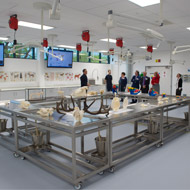
Inspiring the next generation of veterinary pathologists
An £11m Veterinary Pathology Centre has been launched at the University of Surrey to focus on research, surveillance and education.
The new centre is one of the largest and most sophisticated of its kind in Europe, offering high-containment post-mortem examination facilities and histopathology.
Working closely with the veterinary and scientific community, the new centre will be staffed by a highly skilled team of veterinary pathologists, veterinary investigation officers and technicians. Together they will address some of the unique challenges associated with farm animal health surveillance.
Professor Roberto La Ragione, director of the Veterinary Pathology Centre, explains: "Veterinary pathology is a growing discipline and its importance has been highlighted in recent disease outbreaks and the important role veterinary pathologists make in drug development.
"Helping the farming community to be more effective, sustainable and innovative, the Centre will work with partners, businesses and researchers to address some of the unique challenges faced by the veterinary and scientific community.
"It is the close relationships with our external clinical and scientific partners that enables us to be innovative in our approach to education and training here at the Surrey."
The new building contains a large Containment Level 2 post-mortem examination room with a high ceiling, natural lighting and post-mortem examination tables. There are also biological safety cabinets and integrated cold rooms served by a powerful winch system, meaning that a wide range of species can be analysed.
A viewing gallery overlooks the suite and the latest digital technology can be used to record and stream post-mortem examinations for training purposes.
Professor Ragione continues: "The Centre offers the opportunity to inspire the next generation of veterinary pathologists and complements the centres of excellence that already exist in other vet schools and research institutes."
Image (C) University of Surrey.



 The latest
The latest